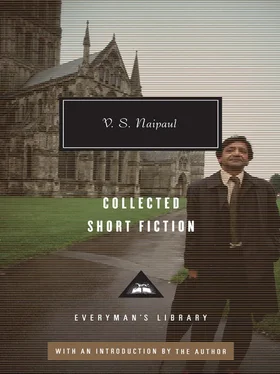Then one Sunday afternoon, some months before the boy leave, Stephen come. Without warning, as usual. This time he is not on a bicycle and he is not alone. He is in a motor-car and he is with his whole family. From the pará—grass field at the back of the house I see the car stop and I see all Stephen’s girl children get out, and I remember the condition of our house. I race up in a foolish kind of way trying to sweep and straighten up. But my heart is failing me, because I can see the house as the girls will see it. And in the end, hearing the voices coming up the steps at the side, I pretend to be like my father, not caring, ready to make a joke of everything, letting people know that we have what we have, and that is that.
So they all come upstairs. And you could see the scorn in the face of Stephen’s Christian wife and his Christian daughters. It would be much more bearable if they was ugly. But they are not ugly, and I feel that their scorn is right. I try to stay in the background. But then my mother, rubbing her dirty foot against her ankle, grin and pull up her veil over the top of her head, as though it is the only thing she have to do to make herself presentable, and she say, ‘But, Stephen, you didn’t give us warning. You had this boy’ — and she point to me — ‘running about trying to clean up the place.’ And she laugh, as though she make a good joke.
The foolish woman didn’t know what she was saying. I run out of the house to the pará—grass field at the back and then through the sugarcane, trying to fight down the shame and vexation.
I walk and walk, and I feel I would never like to go back to the house. But the day finish, I have to go back. The frogs croaking and singing in the canals and the ditches, the dim lights on in the house. Nobody miss me. Nobody care what they did say to me. Nobody ask where I went or what I do. Everybody in the house is just full of this piece of news. Dayo is going to live in the city with Stephen and his family. Stephen is going to send him to school or college and look after his studies. Stephen is going to make him a doctor, lawyer, anything. Everything settled.
It was like a dream. But it come at the wrong moment. I should be happy, but I feel that everything is now poisoned for me. Now that Dayo is about to go away, I begin to feel that I am carrying him inside me the way Stephen is carrying his own son, like something that might break and cut. And at the same time, forgive me, a new feeling is in my heart. I am just waiting for my father and mother, for Stephen and all Stephen’s family, for all of them who was there that day, I am just waiting for all of them to die, to bury my shame with them. I hate them.
Even today I can hate them, when I should have more cause to hate white people, to hate this café and this street and these people who cripple me and spoil my life. But now the dead man is me.
I used to have a vision of a big city. It wasn’t like this, not streets like this. I used to see a pretty park with high black iron railings like spears, old thick trees growing out of the wide pavement, rain falling the way it fall over Robert Taylor in Waterloo Bridge , and the pavement covered with flat leaves of a perfect shape in pretty colours, gold and red and crimson.
Maple leaves. Stephen’s son send us one, not long after he went to Montreal to pursue his higher studies. The envelope is long, the stamp strange, and inside the envelope and his letter is this pretty maple leaf, one leaf from the thousands on that pavement. I handle the envelope and the leaf a lot, I study the stamp, and I see Stephen’s son walking on the pavement beside the black railing. It is very cold, and I see him stopping to blow his nose, looking down at the leaves and then thinking of us his cousins. He is wearing an overcoat to keep out the cold and he have a briefcase under his arm. That is how I think of him in Montreal, furthering his studies, and happy among the maple leaves. And that is how I want to see Dayo.
It was after Stephen’s son went to Montreal that the jealousy really did break out in Stephen’s family against Dayo. They did always scorn the boy. They used to make him sleep in the drawing-room, and he had to make up a bed on the floor after everybody else went to sleep. He didn’t have a room to pursue his studies in, like Stephen’s son. He used to read his books in the tiny front gallery of Stephen’s tiny house. The gallery was almost on the pavement, so that he could see everybody that pass and they could see him. See him? They could reach out a hand and turn the page of the book he was reading. Still, this regular reading and studying he do in the gallery win him a little fame and respect in the area, and I feel it was this little respect that the poor boy start to pick up that make Stephen’s family vexed. They feel they are the only ones who should pursue studies.
Stephen’s daughters especially take against the boy, when you would think they ought to have been proud of their handsome cousin. But no, like all poor people, they want to be the only ones to rise. It is the poor who always want to keep down the poor. So they feel that Dayo is lowering them. It wouldn’t have surprised me to get a message one day from Stephen that Dayo was interfering and tampering with his daughters.
You can imagine how glad they all was when Dayo sit his various exams and fail. You can imagine how much that make their heart rejoice. The reason was the bad school Dayo was going to. He couldn’t get into any of the good ones. Those schools always talk about a lack of background and grounding, and Dayo had to go to a private school where the teachers themselves was a set of dunces without any qualifications. But Stephen’s daughters don’t look at that.
You would think that Stephen, after all his grand charge about progressiveness, would stand up for Dayo and do something to give the boy a little help and courage. But Stephen himself, when his son went away, get very funny. He is not interested in anything at all; he is like a man in mourning. He is like a man expecting bad news, the thing that would break in his hands and cut him. His face get puffy, his hair get grey and coarse.
But the first bad news was mine. I come home one weekday, tired after my lorry work, and I find Dayo. He is well dressed, he is like a man on a visit. But he say he leave Stephen’s house for good, he is not going back. He say, ‘They try to make me a yardboy. They try to get me to run messages for them.’ I could see how much he was suffering, and I could see that he was frightened we wouldn’t believe him and would force him to go back.
It is what my father would like to do. He scratch his arms and rub his hand over the stiff grey hair on his chin, making that sound he does like, and he say, as though he know everything and is very wise, ‘It is what you have to put up with.’
So poor Dayo could only turn to me. And when I look at his face, so sad and frightened, I feel my body get weak and trembling. The blood run up and down my veins, and my arms start hurting inside, as though inside them is wire and the wire is being pulled.
Dayo say, ‘I got to go away. I got to leave. I feel that if I stay here those people are going to cripple me with their jealousy.’
I don’t know what to say. I don’t know the ropes, I don’t have any contacts. Stephen is the man with the contacts, but now I can’t ask Stephen anything.
‘There is nothing for me to do here,’ Dayo say.
‘What about the oilfields?’ I ask him.
‘Oilfields, oilfields. The white people keep the best jobs for themselves. All you could do there is to become a bench-chemist.’
Bench-chemist, I never hear this word before, and it impress me to hear it. Stephen’s family don’t give Dayo any credit for learning, but I can see how much the boy improve in the two years and how he develop a new way of talking. He don’t talk fast now, his voice is not going up and down, he use his hands a lot, and he is getting a nice little accent, so that sometimes he sound like a woman, the way educated people sound. I like his new way of talking, though it embarrasses me to look at him and think that he my brother is now a master of language. So now he start talking, and I let him talk, and as he talk he lose his sadness and fright.
Читать дальше









